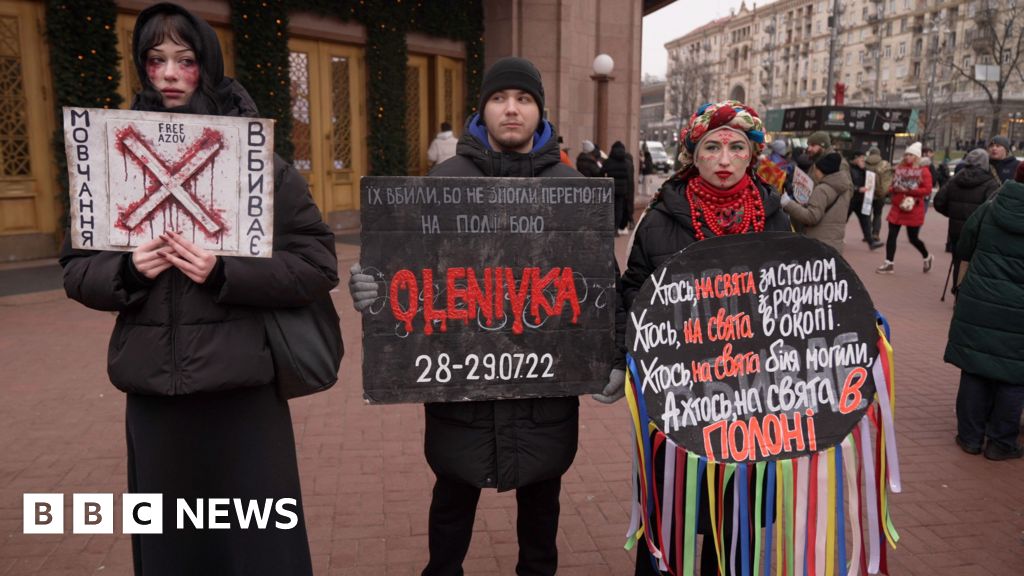ARTICLE AD BOX
 Image source, Reuters
Image source, Reuters
Oleg Orlov was defiant during his court appearance on Thursday
By Steve Rosenberg
Russia editor, Moscow
As soon as he enters the courtroom, Oleg Orlov makes his feelings about this trial crystal clear.
The veteran Russian human rights defender opens his briefcase and takes out a book. He holds it up to the TV cameras. The title is End of the Regime.
"It's a good title. I recommend reading it," declares Mr Orlov, who is one of Russia's most respected rights activists. "It's all about how totalitarian and fascist regimes come to an end."
Oleg Orlov has been an outspoken critic of the two wars the Kremlin is currently waging: the war in Ukraine and, back home, the war on dissent.
Since Russia's full-scale invasion of Ukraine began in February 2022, thousands of Russians have been prosecuted under new laws designed to stifle criticism of the country's war effort.
Mr Orlov, who is 70, is on trial for allegedly breaking one of these laws. He faces up to three years in prison for repeatedly "discrediting" the Russian army with his criticism of the war in Ukraine.
BBC
Claiming that the war in Ukraine is 'in the interests of international peace' is just nonsense."
"The article I'm being tried under is 'Public actions aimed at discrediting the use of the Russian armed forces for protecting the interests of the Russian Federation and its citizens, and preserving international peace and security'," Mr Orlov told me ahead of his trial.
"First of all, the Russian Constitution guarantees freedom of speech. I wrote an article presenting my assessment of events. Prosecuting me for that violates the Constitution.
"Secondly, what is happening in Ukraine - let's be clear and call it a war - it is against the interests of Russia and Russian citizens. As for 'preserving international peace and security', that's a joke. It reminds me of George Orwell's 'War is Peace' and 'Freedom is Slavery'. Claiming that the war in Ukraine is 'in the interests of international peace' is just nonsense."
Article 29 of the Russian Constitution does, indeed, guarantee freedom of speech.
In reality, Russians who publicly criticise those in power here are taking a considerable risk. The Russian authorities have put together a hefty toolbox of repressive laws which can be employed to punish critics of the government and opponents of Russia's war in Ukraine.
Image source, Reuters
Image caption,Russian authorities are swiftly and harshly cracking down on any dissent against those in power
As well as criminalising "discreditation" of the army, Russia's criminal code now punishes what it calls "the public dissemination of deliberately false information about the use of the Russian armed forces".
Often referred to as the "Law on Fakes", it has been used to imprison such vocal Kremlin critics as Ilya Yashin. Last year, he was sentenced to eight-and-a-half years in jail.
Russian theatre director Zhenya Berkovich, who wrote and posted anti-war poems, has been charged with "justifying terrorism" in one of her plays. She faces up to seven years in prison.
Back in April, Kremlin critic and anti-war activist Vladimir Kara-Murza was convicted of treason and sentenced to 25 years in a prison colony.
"The scale of repression and the number of cases is reminiscent of the era of [Soviet leader] Leonid Brezhnev," believes Oleg Orlov. "But by the level of cruelty, and by the length of prison terms being handed out, it's like Stalin's time."
The Orlov trial has sparked international condemnation. The Council of Europe, Europe's oldest political organisation which aims to uphold democracy and human rights across the continent, denounced the case as "a travesty of justice".
"The [Russian] government wants to control the thoughts of people. It wishes to have only opinions that are in agreement with their policies, even when it comes to deciding to start a war," the Council of Europe Commissioner for Human Rights Dunja Mijatovic tells me.
"It's important that the messages coming from all of us who are monitoring what is going on in Russia are strong and clear that this is unacceptable."
In Russia, those behind bars are not forgotten. In the centre of the Russian capital, I watch Muscovites sitting at tables writing letters and postcards to political prisoners.
People in Moscow write letters to prisoners, as a show of support for them and an act of defiance against the state
It's a monthly event organised by Yabloko, one of Russia's last remaining liberal parties that is still allowed to function.
In a country where collective protest is restricted, there's still pen and paper to show solidarity and support. Prisoners' portraits along with their biographies have been printed out on flyers and spread across tables. Visitors can write messages to as many of these people as they want.
"I've come here out of a sense of guilt," a young man called Ilya tells me. "People have gone to jail for expressing their opinions. I think this is wrong. I want to support them."
"Support for Russian political prisoners is so important today," says Alina. "I have acquaintances who are already in prison and I understand that these letters can save their lives."
"When you have nothing to do, your mind starts thinking that you are alone," Yulya says. "You might fall into a depression. So when they read these cards and letters, I hope that makes them feel better."
And for those who write these postcards to prisoners, it is one way of showing that, despite growing repression, they won't be silenced.

 1 year ago
112
1 year ago
112








 English (US) ·
English (US) ·